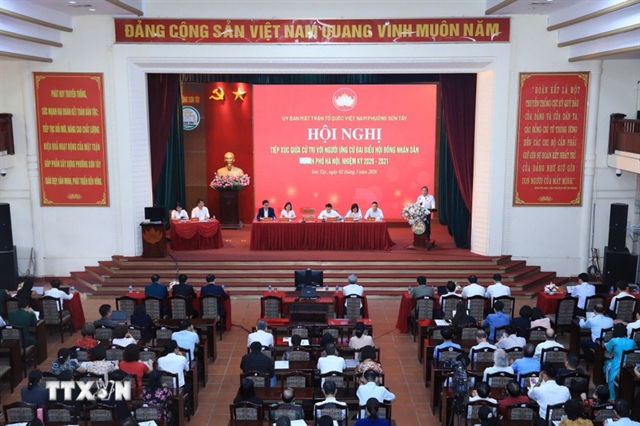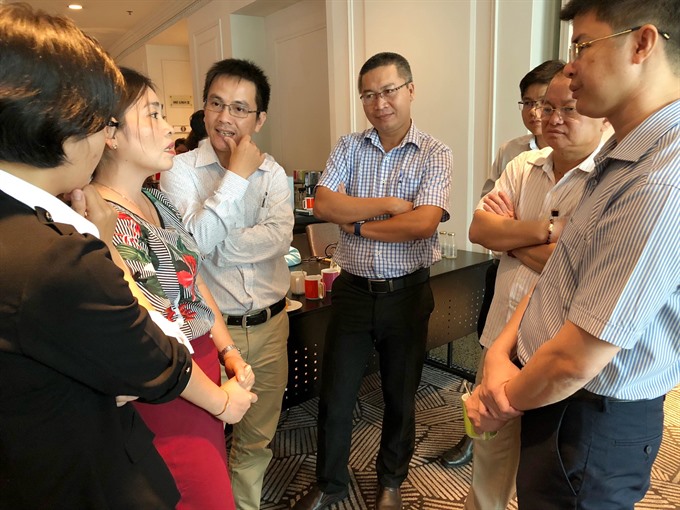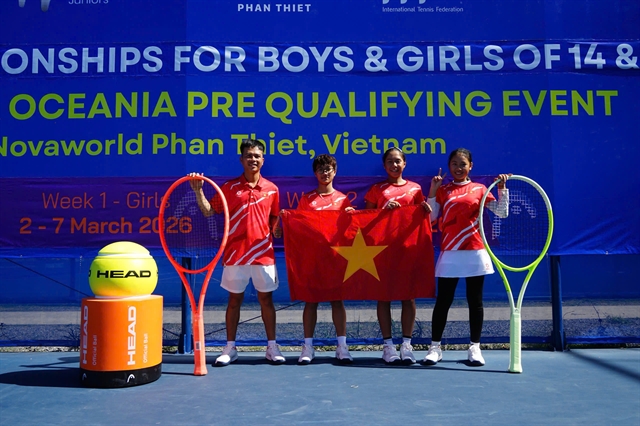 Economy
Economy

With mandatory compliance for shrimp and abalone under the US Seafood Import Monitoring Programme (SIMP) coming into effect in a few more months, Vietnamese processors and exporters of the products need to start preparing data sources now, a US expert has said.
 |
| Attendees on the sidelines of a seminar titled US Seafood Import Monitoring Programme for Shrimp and Abalone in HCM City on August 1. — VNS Photo |
HCM CITY — With mandatory compliance for shrimp and abalone under the US Seafood Import Monitoring Programme (SIMP) coming into effect in a few more months, Vietnamese processors and exporters of the products need to start preparing data sources now, a US expert has said.
Speaking at a seminar in HCM City yesterday, Celeste Leroux, an expert from the National Oceanic and Atmospheric Administration (NOAA), said the programme has established certain requirements for the importation of fish and fish products identified as being particularly vulnerable to illegal, unreported and unregulated (IUU) fishing and/or seafood fraud.
Thirteen species – Abalone, Atlantic cod, blue crab (Atlantic), dolphin fish (Mahi Mahi), grouper, king crab (red), Pacific cod, red snapper, sea cucumber, shark, shrimp, swordfish, and tuna – are identified as particularly vulnerable to IUU fishing and fraud.
December 31 this year is the mandatory compliance date for shrimp and abalone. All other species listed had a mandatory compliance date of January 1 this year, Leroux said.
The rule establishing the SIMP applies only to seafood entering the US from a foreign country, she said.
Importers are required to keep records from harvest to point of entry into the US, she said.
The rule also applies to re-imported product of priority species originally harvested in the US, she said.
She urged Vietnamese producers and exporters to “work with your US importers to make sure they understand the information you provided to them.”
If US importers have any questions about the specific records that Vietnamese companies give them, the NOAA can assist.
“If you have a series of records of the supply chain for entry, you could send that to us and we will look over information for you and let you know if any of the information is missing in the supply chain,” she said.
Speaking on the sidelines of the seminar, Trương Đình Hòe, general secretary of the Việt Nam Association of Seafood Exporters and Producers, said a long time ago Vietnamese seafood exporters established programmes to trace the origin of their products when exporting to the US and EU.
“The issue is how we systematise and standardise the information we need to provide and keep standardised records to maintain our exports to the US.”
Unlike fish, shrimp is mainly farmed and not caught in the wild, he said.
Therefore, the US should have specific rules for shrimp instead of applying the general rules to make it easier for businesses in declaring the required information, he said.
Võ Văn Phục, president and CEO of the Việt Nam Clean Seafood Corporation, said: “All prestigious Vietnamese exporters have been carrying out the origin traceability programme for a long time, so we have a lot of experience and the SIMP programme is not too difficult for us.
“But the procedures are complicated and push up costs for enterprises.”
Leroux said, “The US is a large market for seafood. We purchase approximately US$96 billion worth of seafood a year.”
The US imports 600,000 tonnes of shrimp annually, with Việt Nam accounting for 55,000-60,000 tonnes, according to Hòe.
At the seminar, titled “US Seafood Import Monitoring Programme for Shrimp and Abalone”, specialists from the NOAA answered many questions from local processors and exporters. — VNS




